Choosing a bentonite sulfur manufacturer
Bentonite sulfur is an agricultural fertilizer used throughout North America. Made with elemental sulfur, it is an economical, high-analysis source of nutritional sulfur that can be easily incorporated into blends. With the increased public demand for greater agricultural sustainability, bentonite sulfur is receiving renewed interest as a more environmentally responsible alternative to ammonium sulfate (AMS).
There are many manufacturers of bentonite sulfur products. As a fertilizer division buyer, how do you determine which is the right one for your business and your customers?

Evaluating bentonite sulfurs
The quality, consistency, and performance of bentonite sulfur can vary significantly from one manufacturer to the next. Clay quality and manufacturing processes separate premium bentonite sulfur products from the rest.

Which bentonite sulfurs break down best in the soil?
The higher the quality of the bentonite, the greater its swelling characteristics. The greater its swelling characteristics, the more rapidly and completely the pastilles break down (ie. ‘degrade’).
Conversely, low-quality clays (or good clays blended with lower quality ones) will swell to a far lesser degree and will not fully break the pastille down into small sulfur particles – preventing an acceptable conversion rate to plant-available sulfate. When this happens, customers end up paying for a nutrient that is not benefiting the crop.
Degradability is assessed by measuring the particle size distribution of bentonite sulfurs after they’ve been disintegrated by water. This is done by placing the product in water for a time, then sifting the degraded product through screens to separate the various fractions of particle sizes that result.
The agronomic performance of a product is considered higher if a product degrades more completely and if the final particle sizes are smaller.
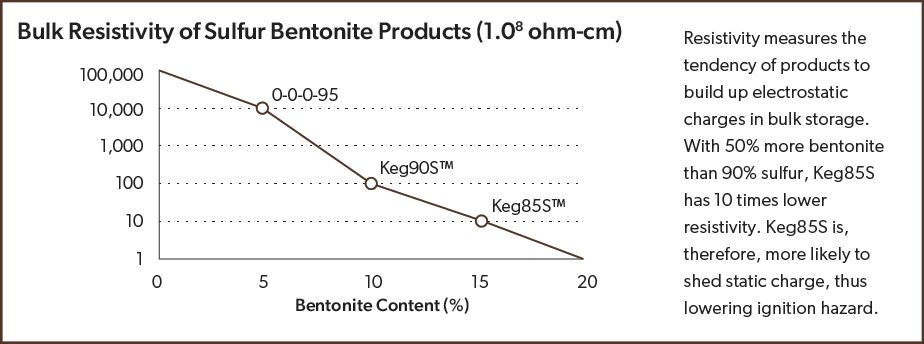
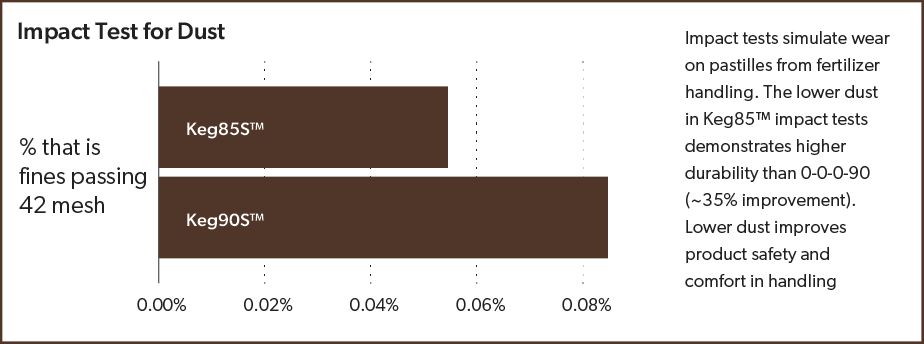
Smaller particle size equates to a higher surface area available for colonization by soil bacteria, resulting in an efficient conversion rate to plant available sulfate.
As a quantitative measure, if a high percentage of a bentonite sulfur product degrades to the size range of 0-200 microns, the product will perform well agronomically.
If a high percentage of a bentonite sulfur product degrades to the size range of 0-200 microns, the product will perform well agronomically.
ASSESSING BENTONITE SULFUR SAFETY
The safety of your people, facilities, and assets are paramount. Fortunately, manufacturers of elemental sulfur fertilizer have made great strides in curtailing the amount of dust generated from their bentonite sulfur products with dust suppressants and best manufacturing processes for dust collection.
Dust collection: Manufacturers that employ advanced dust collection systems at the plant greatly reduce the amount of ‘fines’ in their products. Dust particles can be removed after the forming process and prior to loading/packaging using a mechanical process.
Keg River has moved dust control forward by leaps and bounds, through the introduction of our innovative Cyclone dust collection system at loadout: resulting in what is often regarded by customers as the most dust-free product on the market.
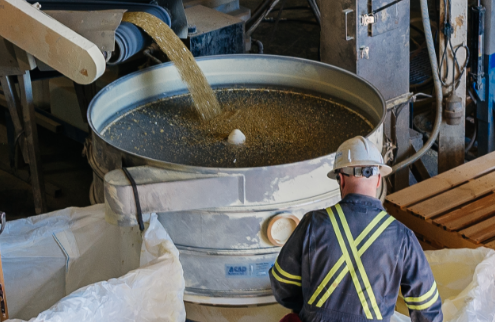
Dust suppression: The application of dust suppressant is an important safety measure that helps to control any existing dust and protect pastilles from generating more dust fines from handling.
The way the dust suppressant is applied is equally critical. Keg River has developed a state-of-the-art application system that ensures 360° coverage at loadout, to achieve much more even coverage on all sides, over conventional systems.
The amount of clay contained in the pastille also plays an important role in minimizing dust. The additional clay content in Keg85S bentonite sulfur not only improves degradability, but it has shown to contribute to 30% greater crush strength compared to the 90 products, for higher durability.
Size and shape: Pastilles that are manufactured to optimum size and dimensional specifications will further reduce the risk of product fracturing during handling.
Keg River has determined the optimum diameter to height ratio is: 2.2 to 1. Our manufacturing process is designed to remove hard edges, which are prone to breakage during the handling process.
Ignition tests are another way to gauge product safety. Keg River has tested Keg85S and Keg90S for ignition of airborne dust in a controlled laboratory environment. Samples were ground to fine dust and measured amounts were made airborne in an explosion chamber with an ignition source. Minimum Explosible Concentrations (MEC) validate the increased safety that results from the additional clay content (see below). The higher the concentration, the safer the product.
The results for Keg50S+ show a further increment of safety when sulfur is blended with non-flammable ingredients (Keg50S+ is a mechanical blend of 58% AMS + 42% Keg90S).
- ProductMinimum Explosible Concentration
- Keg90S50–60 grams/m³
- Keg85S60–70 grams/m³ (higher concentration is required for 1st ignition)
- Keg50S+120-140 grams/m³
Seeing is believing: Fertilizer facility staff responsible for handling and blending bentonite sulfur can quickly tell the difference between a product manufactured using best practices in dust control and those that are not. Choosing the right product can greatly improve plant safety and comfort of use for employees and customers. Stinging, itchy eyes are noticeably absent when handling Keg River product, according to many of our customers.
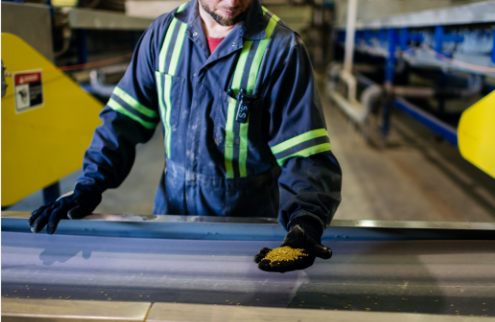
What does bentonite sulfur fertilizer cost?
While most bentonite sulfur fertilizers appear similar on the surface, there can be a large disparity in the performance. This difference may not always be apparent in the manufacturer’s retail price. It is important to know what is inside the fertilizer – to ensure you and your customers are getting what you pay for.
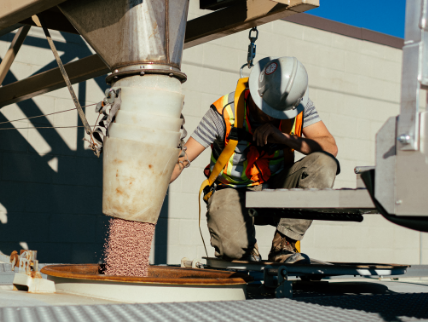
Good bentonite clay costs about 10x as much as sulfur per pound!
The single largest cost in making bentonite sulfur fertilizer is the clay. The top-quality clays, used by Keg River, cost approximately $500/ton. The lowest quality clays start at about half of that. Some manufacturers will opt for the less expensive clays to reduce their manufacturing cost.
Keg River has always been committed to only using the top clays required to deliver consistently superior results. This adds $20+/ton of cost to our finished product versus using cheaper ingredients – but the investment pays off with great performance and agronomic benefits.
Advice for safe handling
When handling bentonite sulfur pastilles, it is recommended that the product is moved by low disturbance conveyors. Augers should be avoided, as the action increases the risk of breakage and dusting. Staff is encouraged to wear protective clothing and eye protection at all times.
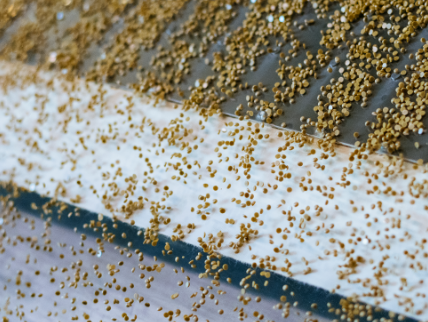
A fertilizer that aligns with the demand for more sustainable agriculture
Environmental impact is front and center in agriculture and is increasingly influencing input and application decisions. As the original nutritional sulfur, elemental sulfur is once again attracting attention as a safe and sustainable alternative to ammonium sulfate (AMS).
There are several reasons why bentonite sulfur aligns with the policies and strategies of today’s sustainability-minded agri-businesses.


Minimal leaching & nutrient loss
With a biologically-mediated slow-release mechanism, elemental sulfur minimizes SO4 leaching (versus AMS). This mitigates the impact on surrounding water sources and ecosystems.

Reduced carbon footprint
As a high analysis, season-long source of S, bentonite sulfur required fewer passes in the field and fewer seeding stops. The ability to surface broadcast bentonite sulfur eliminates the need for tillage (and associated fuel consumption.)
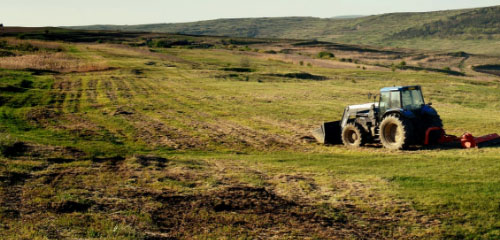
Sulfur sourcing
Nearly all sulfur stock used in the manufacturing of elemental sulfur fertilizer has been removed from atmospheric emissions by the oil and gas sector. Harmful SO2 gas is kept out of the atmosphere, and transformed into agricultural grade sulfur.
6 questions to ask your bentonite sulfur fertilizer manufacturer.
Ask if any research has been conducted into product performance, so you can be confident selling it to your customers.
Ask what steps they take in the manufacturing process to minimize dust.
As we mentioned above, a dust suppressant will improve product safety and handling, creating a better plant environment, and handling experience for the grower.
By rigorously testing and maintaining samples of every batch that is shipped, manufacturers are better equipped to get to the bottom of a performance-related issue.
How does the manufacturer manage high demand periods? What is their daily capacity (how many sulfur machines are in operation)? Do they warehouse product for off-season inventory?
It’s always good to have options. You never know when a strike can impact delivery, or rail capacity issues can lead to backups. It’s wise to choose a supplier that provides the flexibility of delivery by rail or road. You’ll also find the manufacturers that pay their truckers well and treat them with respect tend to benefit from consistently reliable delivery.






